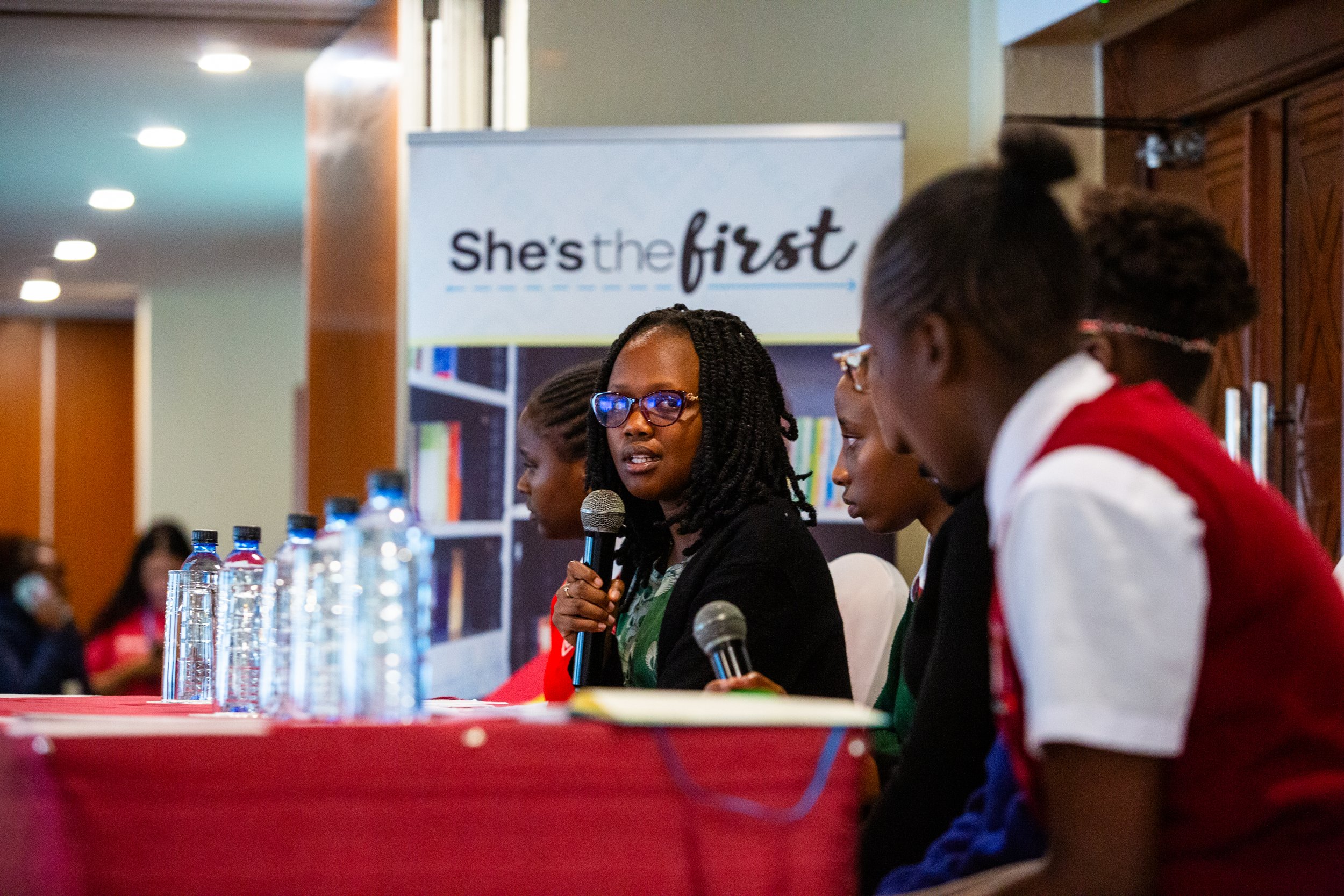I imagined the year to be perfect. But one thing that I learned is that things don’t always go as planned. Sometimes I hope that life is a planned event, and that every detail is decided way before our existence: The people we meet, the places we go, the things we do, or even the impact we make. I feel that things would be a lot easier that way. But in reality, things do not work that way. The pandemic hit, and I realized that my final year was not going to be like I dreamt it would.
Demanding a Power Shift in Education
What Remote Learning Has Taught Me About Girls & COVID-19
Author: Anika Mukker, She’s the First Campus Community
I’m terrible with dates, but I’ll never forget March 13. That was the day my school announced that we would not be returning for four weeks due to the COVID-19 pandemic. Four weeks turned into seven months, and now I’m in 11th grade through distance learning.
Education has always been one of the most important parts of my life, and my love for learning was the driving factor for me getting involved with She’s the First. Nevertheless, adapting to virtual school has been challenging. Personally, having tangible projects helps me remain organized and engaged, and I value face-to-face interaction with teachers and peers. In fact, most of my closest friendships have all been built out of decade-long connections through school.
“Four weeks turned into seven months, and now I’m in 11th grade through distance learning.”
But, the pandemic has taught us is that we, as people, especially girls, are incredibly creative and resilient. Nowadays, I dedicate more time to planning out my routine and self-care while leveraging technology to maintain my connections and continue learning. I also try to participate as much as I can in online lectures -- asking questions, engaging in discussion, and putting a little more effort into connecting with my teachers.
However, COVID-19 and remote learning have also taught us that we cannot disregard the disproportionate impact of global crises on girls.
In April 2020, She’s the First published their Girls Can’t Wait report which states that over 750 million girls have been affected by the pandemic, and the Malala Fund projects 20 million more girls will not return to school when this is over, for a total of ~150 million girls out of school. A follow-up report published in September 2020 further details the severe impact—from steadily rising teenage pregnancy rates to increases in the number of girls working outside of their homes.
“For many, being taken out of school is more than losing out an education. It’s losing out on a safe space, a place to create dreams, and a network of support. ”
With schools being closed and students being forced to learn remotely, girls are separated from important connections with friends, teachers, and mentors as well as important programs. For many, being taken out of school is more than losing out an education. It’s losing out on a safe space, a place to create dreams, and a network of support.
All of this is coupled with the fact that the COVID-19 pandemic has exasperated the digital divide both on a professional and school level. In the same follow up report, community-based organizations also found that only 25% of girls have access to a tech device to aid in their learning.
With inequitable access to technology, girls' voices are quieted; they are unable to speak out on the issues that affect them, gain equal access to opportunities, and utilize necessary tools for their education. Right now, bridging this divide is more important than ever. Technology is an integral part of remote learning and provides a vital means for receiving an education even while schools are shut down.
“My computer, stable WiFi, and phone are the tools that have truly helped me succeed during this pandemic.”
As much as planning and organization have helped me with distance learning, simple things like my computer, stable WiFi, and phone are the tools that have truly helped me succeed during this pandemic. Without them, my questions would be left unanswered; I would not be able to take hold of opportunities in learning and advocacy.
So let our voices be heard: girls can’t wait. All girls have a right to an education, and we need to keep fighting until even a global pandemic cannot take that away.
Support the COVID-19 Response Fund to support girls’ most urgent needs through this pandemic, including remote access to education, hygiene kits, and more.
About Anika: Anika is a junior at Vista Del Lago High School in Folsom, California and the president/founder of her school’s She’s the First chapter. She’s extremely passionate about girls’ rights, especially when it comes to education and how girls lie at the intersection of so many different issues. Outside of STF, she’s involved in Model United Nations, as she aspires to study international relations in the future. In her spare time, she also loves to draw, write, listen to music, travel, and spend time with her loved ones.
How Girls in Uganda Are Facing COVID-19
Many girls worldwide are starting month six of school shutdowns, without concrete plans to return for the foreseeable future. She’s the First’s partners are vital sources of support for thousands of girls, ensuring that girls have basic necessities, protective personal equipment, and access to continuing education whenever possible.
Hear from three girls served by our partner Arlington Academy of Hope (AAH) in Uganda on how COVID-19 has shifted their educations and how AAH is stepping up to meet their needs as a community-based organization.
My name is Elizabeth N, and I’m a teenage student in Uganda. I stay with my mother who takes care of my siblings and me. I’d like to share a story with you about how I have been affected by COVID-19.
Previously when everything was normal, I used to go early to school and carry out my lessons like any other girl or student should. I was always able to have my two meals at school, breakfast and a nice lunch. I used to play with my friends and the teachers around me could always guide me on the best things to do.
But due to the outbreak of COVID-19, schools closed and now here I am, at home with my single mum. My mum has to do several small errands for other people like fetching firewood, digging in their gardens, grazing animals like cattle to support us at home. Sometimes, having a meal depends then on whether my mother has work to do during the day or not. Life has changed in this way, because when schools were running, I was always assured of having meals. The girls’ coordinator at AAH has made sure I can continue to receive meals, and I am so grateful for this.
Our school at AAH does provides us with weekly work to do about different educational topics, so we are always kept busy while at home. Many times, I face the challenge of being unable to read at night, because we do not have electricity or solar lights at home, so I make sure to utilize every free time I have during day. I really miss school, my teachers, friends and the care I get while schools are open and am excited to return!
Hello everyone! My name is Fridah, and my dream is to one day become a doctor.
I’m a senior student in my class, and pre-COVID-19, I was going to sit for my national exams this October. Now schools have been closed and I shall not be able to pursue these exams. This is painful, so painful to me coupled with the fact that I knew that I would be going to another class level next year.
At the moment however, I’m keeping myself busy by helping my mother sell in her small retail shop. Through this, we are able to raise some little money for our necessities. During my free time while at the shop, I get to revise my books so that I can always keep myself informed and updated so that even after this, I will be able to perform my best at school when they open. I believe nothing can stop me from achieving my goal!
My name is Salama. I am in the seventh class at the Arlington Academy of Hope. I love my school so much. I also love going to school because it is fun and enjoyable there.
During this lockdown, I have learned a new skill of mending. Whenever my slippers or clothes are ripped or broken, I can mend them on my own so I do not need to spend any money on this.
I encourage all other girls in my community to learn similar skills which can help them and also enable their families to save money, which could be spent on other needs instead of a task that can be easily done.
Your support of the COVID-19 Response Fund ensures community-based organizations like Arlington Academy of Hope and girls in Uganda can survive through this pandemic. Make a contribution now!
The Power of Technology in a Pandemic: From Four Girls in Nepal
In a report from the Bookings Institution, only 25 percent of low-income countries have been able to continue education remotely with access to technology, compared to 90 percent in higher-income countries. At Blink Now, our STF partner in Nepal, girls have access to technology tools, and even then the internet connection can be unstable or inconsistent. Without regular, sustained technology available, that means limited access to safe spaces, regular mentorship, and continued education.
Hear from four girls in Nepal—Jharana, Roshni, Sarita, and Aliza—on how COVID-19 and access to technology has affected their education over the last few months, and what remote connection can make possible in their communities.











